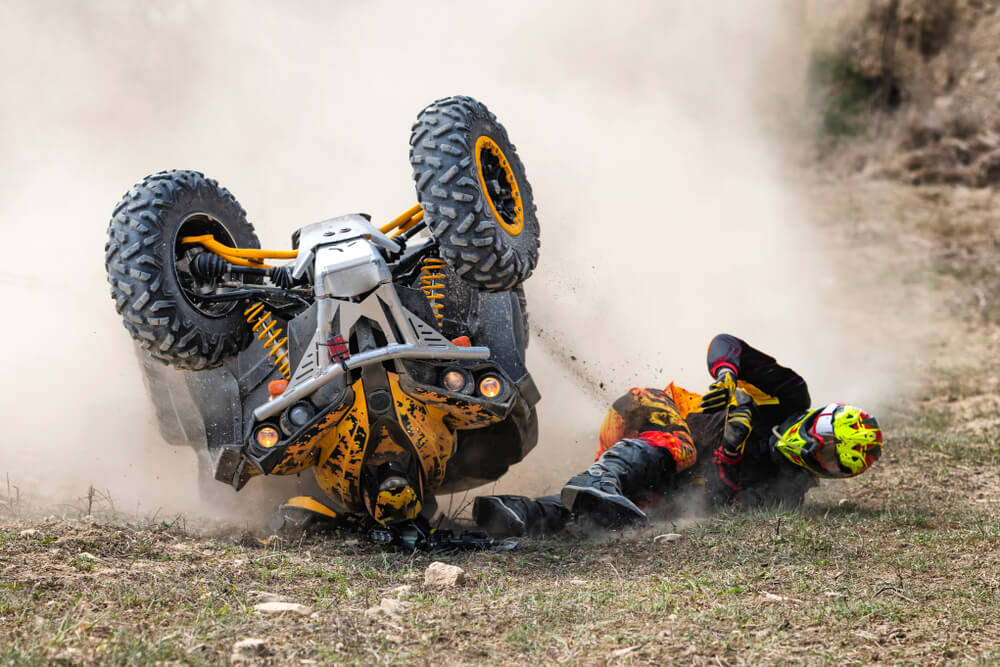All-terrain vehicles (ATVs) and off-road vehicles (ORVs) are commonly used for work, transportation, and recreation in British Columbia. In some ways, ATVs are more dangerous than passenger vehicles. By design, off-road vehicles cannot offer riders the same safety protection as cars. The responsibility falls on the driver to exercise extreme caution on every trip. Any negligence by a driver or other party could result in serious or fatal injuries.
Did you suffer injuries in an ATV accident in B.C.? Proving the other party’s negligence is the key to recovering the compensation you deserve. A Vancouver ATV accident lawyer from Warnett Hallen LLP can gather the evidence you need to build a strong case for maximum compensation.
The strength of the evidence can make or break a personal injury claim, so it’s wise to get legal help now. Call or contact us today for a case evaluation.
Who Can Be Held Liable for an ATV Accident?
The Off-Road Vehicle Act mandates that drivers cannot operate ATVs negligently on Crown land or prescribed private land. Failure to comply with these laws could have criminal and civil penalties if someone gets hurt.
Here are straightforward answers to some of the most frequently asked questions about ATV accident liability:
If someone gets hurt on my ATV, am I liable?
You could be liable if someone gets hurt on an ATV you loaned them. If your friend’s negligence contributed to their injuries, that might relieve you of some responsibility. However, if you knew or should have known that your friend was too young, inexperienced, or impaired to ride safely, you could share some of the blame for an ATV crash.
I wrecked my friend’s ATV. Who is liable?
It depends. If your friend permitted you to ride their ATV even though they knew or should have known that it was not safe for you, they could be vicariously liable for your actions. However, if you wrecked the ATV even though you knew better, you may be largely or entirely responsible.
What happens when an ATV accident occurs on private property?
It depends on the facts of the case. If the ATV accident happened on private residential property, it might be covered under a homeowners’ insurance policy. If the accident occurred on commercial property, it might be covered under a commercial insurance policy.
Who else could be at fault for an ATV accident?
Any of the following parties could be at fault in a British Columbia ATV accident:
- The ATV operator
- Another negligent road user
- An ATV owner
- A negligent property owner
- The manufacturer of faulty ATV parts
Compensation in an ATV Injury Case
So, what types of compensation are available in an ATV accident claim? Will auto insurance cover damages in an ATV accident? Reviewing the insurance requirements for off-road vehicles in British Columbia and some recent changes to the province’s auto insurance laws can give you the answers you need.
Insurance is technically optional for ATVs operated on Crown land in most areas. However, ATV operators who ride along or across highways are required to carry ICBC Basic Autoplan insurance. Those who drive along forest service roads must have at least $200,000 in third-party liability insurance. This coverage can provide money for medical expenses and lost income to accident victims up to certain limits.
If you are seriously injured in an ATV crash, you may also have grounds to file a personal injury lawsuit against the negligent party. ATV accident compensation can include money for:
- Medical bills
- Lost wages
- Lost earning potential
- Lost quality of life
- Pain and suffering
You’ll have a lot to handle after an ATV wreck. Turning your case over to an experienced lawyer lets you focus on your recovery while knowing your legal team is gathering the evidence needed for a solid accident claim.
Proving Negligence for an ATV Accident
If you have grounds for a third-party liability insurance claim or a personal injury lawsuit, negligence will be an essential component of your case. When you hold another party liable after an ATV accident, you hold them accountable for their recklessness and recover the compensation you need to heal.
Common types of evidence that serve as proof in an ATV accident lawsuit include:
- Medical records
- The police accident report
- Photos and video footage of the ATV accident scene
- Eyewitness statements
- Expert testimony
- Documentation of your accident-related financial losses
Negligence comes in two forms. It can stem from a party’s careless actions — such as driving while intoxicated — or from their failure to take steps to prevent harm. For example, an ATV owner who knowingly allows an underage driver to operate the vehicle could be held liable for their role in contributing to a crash that injures or kills another.
Recommendations for ATV Safety
Whether you ride an ATV for work or play, you can keep yourself and others safe by taking the proper precautions. You should:
- Wear appropriate safety gear at all times, especially a helmet.
- Stay on designated off-road trails.
- Travel at safe speeds and adjust your speed as needed in poor conditions.
- Avoid riding along paved roads unless crossing legally at designated locations.
- Never operate or allow anyone else to use an ATV while under the influence.
- Do not double up two riders on one seat or exceed the capacity of any ATV.
- Make sure younger riders have youth-sized ATVs and constant adult supervision.
Consult an ATV and Off-Road Vehicle Accident Lawyer Today
If you were injured in an ATV or ORV accident in British Columbia, the lawyers at Warnett Hallen LLP can help you demand fair compensation from the at-fault party. When you work with us, you get a committed legal team dedicated to pursuing maximum results for you.
The road to justice starts with our law firm. Call or contact us today for a case evaluation.





